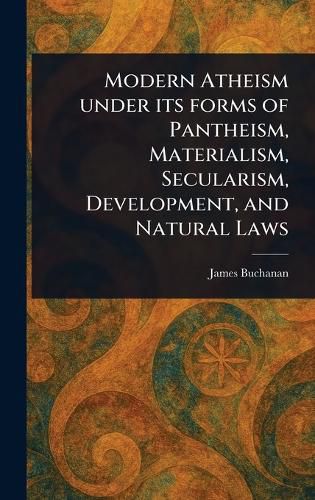Readings Newsletter
Become a Readings Member to make your shopping experience even easier.
Sign in or sign up for free!
You’re not far away from qualifying for FREE standard shipping within Australia
You’ve qualified for FREE standard shipping within Australia
The cart is loading…






This title is printed to order. This book may have been self-published. If so, we cannot guarantee the quality of the content. In the main most books will have gone through the editing process however some may not. We therefore suggest that you be aware of this before ordering this book. If in doubt check either the author or publisher’s details as we are unable to accept any returns unless they are faulty. Please contact us if you have any questions.
James Buchanan's "Modern Atheism" offers a comprehensive exploration of atheistic thought as it manifested in the 19th century. This meticulously prepared reprint delves into the varied forms of atheism prevalent during the era, including pantheism, materialism, and secularism. Buchanan examines the philosophical underpinnings of these movements, tracing their arguments concerning development and natural law.
A significant work of religious philosophy, "Modern Atheism" critically analyzes the challenges posed by atheism to traditional theology. This enduring study investigates the core tenets of atheistic belief systems, providing valuable insights into the ongoing dialogue between religion and science. A timeless resource for those interested in the history of atheism and its relationship to religious thought, this book provides a window into intellectual debates that continue to resonate today.
This work has been selected by scholars as being culturally important, and is part of the knowledge base of civilization as we know it.
This work is in the public domain in the United States of America, and possibly other nations. Within the United States, you may freely copy and distribute this work, as no entity (individual or corporate) has a copyright on the body of the work.
Scholars believe, and we concur, that this work is important enough to be preserved, reproduced, and made generally available to the public. We appreciate your support of the preservation process, and thank you for being an important part of keeping this knowledge alive and relevant.
$9.00 standard shipping within Australia
FREE standard shipping within Australia for orders over $100.00
Express & International shipping calculated at checkout
This title is printed to order. This book may have been self-published. If so, we cannot guarantee the quality of the content. In the main most books will have gone through the editing process however some may not. We therefore suggest that you be aware of this before ordering this book. If in doubt check either the author or publisher’s details as we are unable to accept any returns unless they are faulty. Please contact us if you have any questions.
James Buchanan's "Modern Atheism" offers a comprehensive exploration of atheistic thought as it manifested in the 19th century. This meticulously prepared reprint delves into the varied forms of atheism prevalent during the era, including pantheism, materialism, and secularism. Buchanan examines the philosophical underpinnings of these movements, tracing their arguments concerning development and natural law.
A significant work of religious philosophy, "Modern Atheism" critically analyzes the challenges posed by atheism to traditional theology. This enduring study investigates the core tenets of atheistic belief systems, providing valuable insights into the ongoing dialogue between religion and science. A timeless resource for those interested in the history of atheism and its relationship to religious thought, this book provides a window into intellectual debates that continue to resonate today.
This work has been selected by scholars as being culturally important, and is part of the knowledge base of civilization as we know it.
This work is in the public domain in the United States of America, and possibly other nations. Within the United States, you may freely copy and distribute this work, as no entity (individual or corporate) has a copyright on the body of the work.
Scholars believe, and we concur, that this work is important enough to be preserved, reproduced, and made generally available to the public. We appreciate your support of the preservation process, and thank you for being an important part of keeping this knowledge alive and relevant.